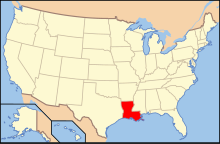LGBTQ rights in Louisiana | |
|---|---|
 | |
| Status | Legal since 2003 (Lawrence v. Texas) |
| Gender identity | Altering sex on identity documents requires sex reassignment surgery |
| Discrimination protections | Protections in employment; some municipalities have passed further protections |
| Family rights | |
| Recognition of relationships | Same-sex marriage since 2015 |
| Adoption | Full adoption rights since 2014 |
Lesbian, gay, bisexual, transgender, and queer (LGBTQ) people in the U.S. state of Louisiana may face some legal challenges not experienced by non-LGBTQ residents. Same-sex sexual activity is legal in Louisiana as a result of the U.S. Supreme Court decision in Lawrence v. Texas. Same-sex marriage has been recognized in the state since June 2015 as a result of the Supreme Court's decision in Obergefell v. Hodges. New Orleans, the state's largest city, is regarded as a hotspot for the LGBTQ community.[1][2]
In September 2014, two courts, one federal and one state, produced contradictory rulings on the constitutionality of the state's denial of marriage rights to same-sex couples. The U.S. Supreme Court resolved that conflict when it ruled such bans unconstitutional in Obergefell v. Hodges on June 26, 2015. Two days later, Governor Bobby Jindal said the state would comply with that ruling and license same-sex marriages.
Discrimination on account of sexual orientation and gender identity is prohibited in employment as a result of Bostock v. Clayton County, but not in the areas of housing, health care, education, credit or public accommodations. A 2017 opinion poll from the Public Religion Research Institute showed that 63% of Louisiana residents supported anti-discrimination legislation protecting LGBTQ people.
- ^ "LGBT Travellers in New Orleans, USA". Lonely Planet. Archived from the original on July 17, 2021. Retrieved 2021-07-17.
- ^ "New Orleans Gay History". www.neworleans.com. Archived from the original on July 17, 2021. Retrieved 2021-07-17.